Pentagon tied D.C. National Guard general's hands before Capitol siege
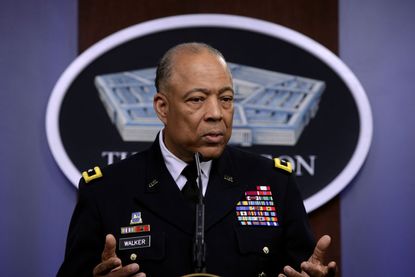

Lots of things went wrong with law enforcement before and during the Jan. 6 siege of the U.S. Capitol by a mob of supporters of former President Donald Trump, and one of them was the long delay in deployment of National Guard reinforcements. Those failures were the focus of a closed-door hearing Tuesday before the House Appropriations Committee, and among those who testified was Maj. Gen. William Walker, commander of the D.C. National Guard. Walker told The Washington Post on Tuesday that the Pentagon had tied his hands.
Because Washington, D.C., isn't a state, the president is nominally in charge of the D.C. National Guard. In practice, the defense secretary and Army secretary are in command, but Walker, like all National Guard commanders, typically has the power to take military action in an emergency. "All military commanders normally have immediate response authority to protect property, life, and in my case, federal functions — federal property and life," Walker told the Post. "But in this instance I did not have that authority."
In a Jan. 5 memo, Army Secretary Ryan McCarthy, who was Walker's direct superior until he stepped down last week, prohibited Walker from deploying a ready force of 40 Guardsmen without a formal "concept of operations" plan, the Post reports. In a Jan. 4 memo, acting Defense Secretary Christopher Miller had prohibited McCarthy from authorizing the deployment of D.C. Guardsmen carrying helmets, body armor, riot control agents, or weapons without his approval, and said the quick reaction force could be dispatched "only as a last resort."
Subscribe to The Week
Escape your echo chamber. Get the facts behind the news, plus analysis from multiple perspectives.

Sign up for The Week's Free Newsletters
From our morning news briefing to a weekly Good News Newsletter, get the best of The Week delivered directly to your inbox.
From our morning news briefing to a weekly Good News Newsletter, get the best of The Week delivered directly to your inbox.
Pentagon officials say the requirement for top-level authorization was a response to the D.C. Guard's participation in Trump's widely criticized crackdown on racial justice protests in June. "When you go back to times when we've done this, like June, we wanted to make sure we were very careful about the employment — careful about fragmentary orders," McCarthy told the Post.
There was also concern at the Pentagon about sending soldiers nominally under Trump's command into a riot of Trump supporters, because that might give the impression Guardsmen were aiding a pro-Trump coup, the Post reports. Those concerns, valid as they may be, don't explain why it took three hours for the Pentagon to deploy the National Guard after the rioters had already overrun the Capitol. Read more at The Washington Post.
Create an account with the same email registered to your subscription to unlock access.
Sign up for Today's Best Articles in your inbox
A free daily email with the biggest news stories of the day – and the best features from TheWeek.com
Peter has worked as a news and culture writer and editor at The Week since the site's launch in 2008. He covers politics, world affairs, religion and cultural currents. His journalism career began as a copy editor at a financial newswire and has included editorial positions at The New York Times Magazine, Facts on File, and Oregon State University.
-
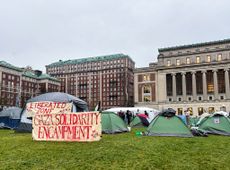 'Republicans want to silence Israel's opponents'
'Republicans want to silence Israel's opponents'Instant Opinion Opinion, comment and editorials of the day
By Harold Maass, The Week US Published
-
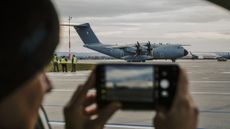 Poland, Germany nab alleged anti-Ukraine spies
Poland, Germany nab alleged anti-Ukraine spiesSpeed Read A man was arrested over a supposed Russian plot to kill Ukrainian President Zelenskyy
By Peter Weber, The Week US Published
-
 Today's political cartoons - April 19, 2024
Today's political cartoons - April 19, 2024Cartoons Friday's cartoons - priority delivery, USPS on fire, and more
By The Week US Published
-
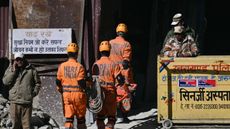 Puffed rice and yoga: inside the collapsed tunnel where Indian workers await rescue
Puffed rice and yoga: inside the collapsed tunnel where Indian workers await rescueSpeed Read Workers trapped in collapsed tunnel are suffering from dysentery and anxiety over their rescue
By Sorcha Bradley, The Week UK Published
-
 More than 2,000 dead following massive earthquake in Morocco
More than 2,000 dead following massive earthquake in MoroccoSpeed Read
By Justin Klawans Published
-
 Mexico's next president will almost certainly be its 1st female president
Mexico's next president will almost certainly be its 1st female presidentSpeed Read
By Peter Weber Published
-
 North Korea's Kim to visit Putin in eastern Russia to discuss arms sales for Ukraine war, U.S. says
North Korea's Kim to visit Putin in eastern Russia to discuss arms sales for Ukraine war, U.S. saysSpeed Read
By Peter Weber Published
-
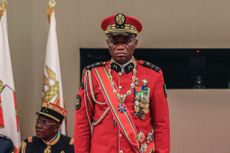 Gabon's military leader sworn in following coup in latest African uprising
Gabon's military leader sworn in following coup in latest African uprisingSpeed Read
By Justin Klawans Published
-
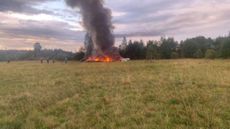 Nobody seems surprised Wagner's Prigozhin died under suspicious circumstances
Nobody seems surprised Wagner's Prigozhin died under suspicious circumstancesSpeed Read
By Peter Weber Published
-
 Western mountain climbers allegedly left Pakistani porter to die on K2
Western mountain climbers allegedly left Pakistani porter to die on K2Speed Read
By Justin Klawans Published
-
 'Circular saw blades' divide controversial Rio Grande buoys installed by Texas governor
'Circular saw blades' divide controversial Rio Grande buoys installed by Texas governorSpeed Read
By Peter Weber Published